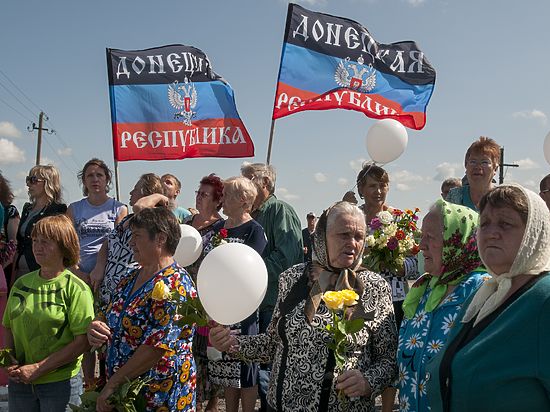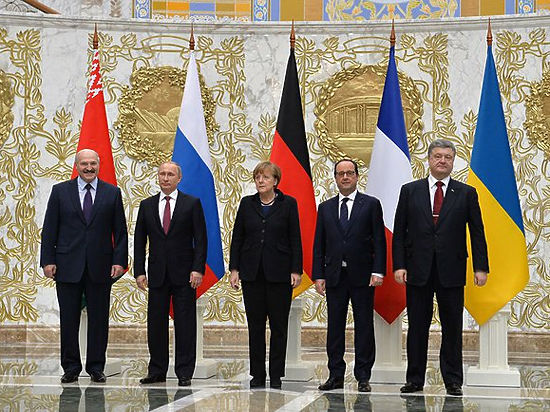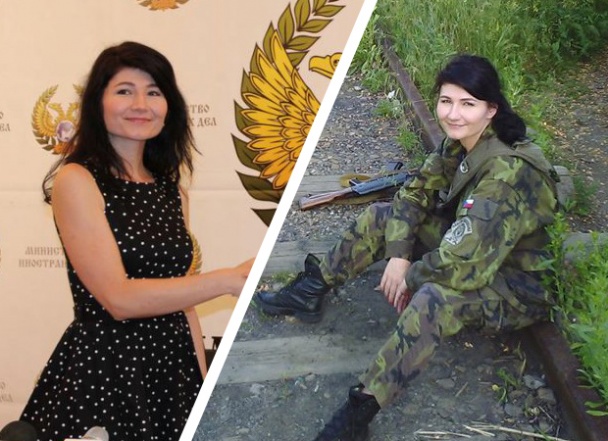Russia's president Putin and foreign minister Lavrov have outlined Russia's new aims in Ukraine in two clearly worded statements: Putin - on 19 June 2015 at the St Petersburg economical forum, and Lavrov - in a 19 June 2015 interview to RBK TV.
They explain why Russia has ordered its forces and its proxies in East Ukraine to continue and increase shelling and reconnaissance in force in East Ukraine.
Ukraine, EU countries and US must be aware of this new strategy.
It is of utmost importance France and Germany counter this new strategy on the Paris 23rd June 2015 meeting of foreign ministers of France, Germany, Russia and Ukraine.
The aims are best outlined by Putin in two answers to Charlie Rose, the 2nd and 3rd of these.
Firstly: Putin states there will be no ceasefire in East Ukraine in the Russia-Ukraine war if Russia's conditions are not approved by Ukraine, France and Germany. In this quote Putin directly says that the Russian weapons and troops will be gone if and only if Russia's conditions are accepted.
Putin:
"I would like to say that if this situation is resolved by political means, no weapons will be necessary, but it does require goodwill and a desire to enter into direct dialogue, and we will assist in this. What we cannot do and would never agree to is for someone somewhere, anywhere, to proceed from a position of force, first using the police (they call it militia there), then special services, and then the armed forces.
Before the army units and the so-called battalions – armed nationalist units – appeared on those territories, there were no weapons there; and there still would have been none had they tried to resolve the situation by peaceful means right from the start. Weapons appeared there only after they started killing people using tanks, artillery, multiple launch rocket systems and aviation. That gave rise to resistance. Once an attempt is made to resolve the issue by political means, the weapons will be gone."
Secondly, Putin outlines the conditions for the "political settlement".
1. Ukraine must allow Russia via its proxies to dictate its constitution.
Putin:
"The first one is constitutional reform, and the Minsk agreements say clearly: to provide autonomy or, as they say decentralisation of power, let it be decentralisation. This is quite clear, our European partners, France and Germany have spelt it out and we are quite satisfied with it, just as the representatives of Donbas are. This is one component."
The proposals are listed in an English-language summary of the full article in Russian.
The main points include:
- Ukraine is to be outside any military alliances, in particularly NATO, proposed as new article 17 or 18;
- The regions with special status are to have an independent armed militia;
- The regions have independent judiciary appointed by the regions;
- The regions are to control their natural resources;
- The regions will receive subsidies from Ukraine state budget;
- The Regions are allowed to conclude international treaties;
- The regions are allowed to conduct separate referendums.
James Socor offers an analysis of the proposals.
Parts of the amendment mentioning Crimea and Sevastopol have since been withdrawn but other proposals remain as is.
If implemented, the proposal would create effectively Russia-controlled sub-states within Ukraine and prevent Ukraine from joining NATO and in practice also EU.
2. Ukraine must give "DNR", "LNR" autonomy on conditions set by Russia via its proxies
Putin:
"The second thing that has to be done – the law passed earlier on the special status of these territories – Luhansk and Donetsk, the unrecognised republics, should be enacted. It was passed, but still not acted upon. This requires a resolution of the Supreme Rada – the Ukrainian Parliament, which is also covered in the Minsk agreements.
Our friends in Kyiv have formally complied with this decision, but simultaneously with the passing by the Rada of the resolution to enact the law they amended the law itself – article 10, I believe, which practically renders the action null and void. This is a mere manipulation, and they have to move from manipulations to real action.
And finally, they need to pass a law on municipal elections on these territories and to have the elections themselves. All this is spelled out in the Minsk agreements, this is something I would like to draw your attention to, and all this should be done with the agreement of Donetsk and Luhansk."
Ukraine has already passed the law. The first version was passed already on 16th September 2014.
The problem with the law to Putin's Russian government and its proxies is that the law foresees a honest election, where the current proxy authorities cannot stand as candidates. For this reason, Russia's proxies have proposed an election procedure rigged to make their victory certain.
An analysis on local election procedure proposed by Russia proxies by James Socor is here.
3. Ukraine must grant amnesty to the Russia proxies, and effectively to Putin himself
Putin:
"The third thing is a law on amnesty. It is impossible to have a political dialogue with people who are threatened with criminal persecution."
Note translation mistake, instead of correct "prosecution" the translation uses "persecution".
Ukraine has already passed an amnesty law, on 16 September 2014, but it gives amnesty only to those who have not engaged in serious crimes.
Thus it does not for instance give amnesty for starting the war in Sloviansk on 12 April 2014 to Igor "Strelkov" Girkin, no amnesty for those responsible for shooting down MH17 as Igor Girkin, Alexander Borodai and all their underlings and superiors, nor amnesty for Arseni "Motorola" Pavlov and Mikhail "Givi" Tolstykh and their superiors Alexander Zakharchenko and Eduard Basurin for murdering and mistreating Ukraine POWs.
The main reason is that any trial in this issue would bring forth evidence that the atrocities have been conducted with permission, with equipment and troops or according to direct orders from Russia's supreme commander, who is according to normal "command responsibility" doctrine responsible for actions of those under him as long as he has not seen that they are prosecuted for their crimes.
It is clear that here Putin refers, first of all, to himself.
4. Ukraine must foot the bill for the occupied area
Putin:
"Finally, they have to begin the economic recovery of these territories, of course.
I would like to repeat something I have already said many times: the excuse that ‘we do not have the money’ does not work here. If the current authorities in Kyiv believe that this is Ukrainian territory inhabited by Ukrainian citizens who have the right to receive, say, disability benefits or the pensions that they earned under the existing Ukrainian law, the Kyiv authorities cannot refuse to pay, they simply have no right to do so. They are violating their own constitution. All this has to be done, and not in words, but in practice."
Practically, here Putin says that Ukraine must take economical responsibility for a region which has been economically destroyed, and whose policies would also in future be directly subordinate to Russia. Roughly the same as if Georgia had to pay fo Abkhazia or South Ossetia or Moldova for Transnistria.
Putin's and Lavrov's proxies in East Ukraine have already reiterated their statements.
Denis Pushilin, "DNR" envoy to the Contact Group, on 21 June 2015, was quoted by TASS as saying:
"It is impossible to have peace without political decisions. Shelling will continue then."
I have previously already described how Putin directed the immediate breakdown of Minsk2 ceasefire in Battle of Debaltseve.





